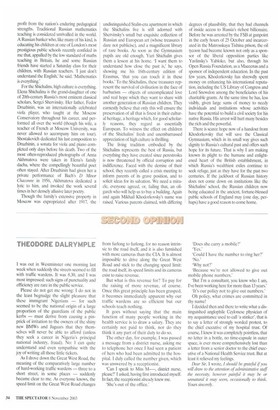THEODORE DALRYMPLE
I was out in Westminster one morning last week when suddenly the streets seemed to fill with traffic wardens. It was 8.30, and I was most impressed; such signs of punctuality and efficiency are rare in the public service.
Please do not get me wrong: I do not in the least begrudge the slight pleasure that these immigrant Nigerians — for such seemed to be the national origin of a large proportion of the guardians of the public kerbs — must derive from causing a pinprick of irritation to the owners of the shiny new BMWs and Jaguars that they themselves will never be able to afford (unless they seek a career in Nigeria's principal national industry, fraud). No: I can quite understand and even sympathise with the joy of writing all those little tickets.
As I drove down the Great West Road, the meaning of the comparatively large number of hard-working traffic wardens — three to a short street, in some places — suddenly became clear to me. As everyone knows, the speed limit on the Great West Road changes from furlong to furlong, for no reason intrinsic to the road itself, and it is also furnished with more cameras than the CIA. It is almost impossible to drive along the Great West Road and stick to the changing speed limit: the road itself, its speed limits and its cameras exist to raise revenue.
But what is this revenue for? To pay for the raising of more revenue, of course. Once this great principle has been grasped, it becomes immediately apparent why our traffic wardens are so efficient but our schools teach nothing.
It goes without saying that the main function of many people working in the health service is to draw a salary. They are certainly not paid to think, nor do they think it any part of their duty to do so.
The other day, for example, I was passed a message from a district nurse, asking me to telephone her once I had seen a patient of hers who had been admitted to the hospital. I duly called the number given, which was answered by a receptionist.
'Can I speak to Miss M—, district nurse, please?' I asked, having first introduced myself. In fact, the receptionist already knew me.
'She's out of the office.' 'Does she carry a mobile?'
'Yes.'
'Could I have the number to ring her?' 'No.'
'Why not?'
'Because we're not allowed to give out mobile phone numbers.'
'But I'm a consultant, you know who I am, I've been working here for more than 13 years.' 'It's our policy not to give out numbers.' Oh policy, what crimes are committed in thy name!
I decided then and there to write what a distinguished anglophile Ceylonese physician of my acquaintance used to call 'a stinker', that is to say a letter of strongly worded protest, to the chief executive of my hospital trust. Of course, I knew it was completely pointless, that no letter in a bottle, no time-capsule in outer space, is ever more comprehensively lost than a letter from a senior doctor to the chief executive of a National Health Service trust. But at least it relieved my feelings.
Dear Sir, I wrote, I shoold be grateful if you will draw to the attention of administrative staff the necessity, however painful it may be or unnatural it may seem, occasionally to think Yours sincere*.


































































































 Previous page
Previous page